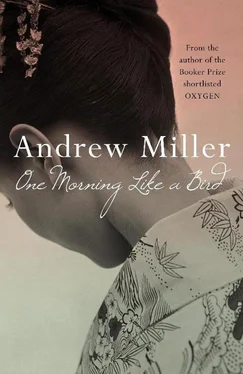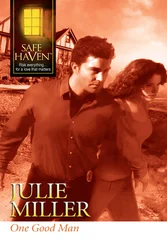Andrew Miller - One Morning Like a Bird
Здесь есть возможность читать онлайн «Andrew Miller - One Morning Like a Bird» весь текст электронной книги совершенно бесплатно (целиком полную версию без сокращений). В некоторых случаях можно слушать аудио, скачать через торрент в формате fb2 и присутствует краткое содержание. Год выпуска: 2009, Издательство: Sceptre, Жанр: Историческая проза, на английском языке. Описание произведения, (предисловие) а так же отзывы посетителей доступны на портале библиотеки ЛибКат.
- Название:One Morning Like a Bird
- Автор:
- Издательство:Sceptre
- Жанр:
- Год:2009
- ISBN:нет данных
- Рейтинг книги:4 / 5. Голосов: 1
-
Избранное:Добавить в избранное
- Отзывы:
-
Ваша оценка:
- 80
- 1
- 2
- 3
- 4
- 5
One Morning Like a Bird: краткое содержание, описание и аннотация
Предлагаем к чтению аннотацию, описание, краткое содержание или предисловие (зависит от того, что написал сам автор книги «One Morning Like a Bird»). Если вы не нашли необходимую информацию о книге — напишите в комментариях, мы постараемся отыскать её.
One Morning Like a Bird — читать онлайн бесплатно полную книгу (весь текст) целиком
Ниже представлен текст книги, разбитый по страницам. Система сохранения места последней прочитанной страницы, позволяет с удобством читать онлайн бесплатно книгу «One Morning Like a Bird», без необходимости каждый раз заново искать на чём Вы остановились. Поставьте закладку, и сможете в любой момент перейти на страницу, на которой закончили чтение.
Интервал:
Закладка:
The boy — for this is what Yuji remembers of it, what he believes he remembers, what he would set down as an account, more or less accurate, of the actual events — was from the Low City and not perhaps the eleven- or twelve-year-old he is in the dreams but a teenager or even a young man of sixteen or seventeen who, once the fires started soon after the first shocks at midday (shocks so violent the seismographs at the Central Weather Bureau were immediately rendered useless), would have been a link in those disciplined chains of neighbours who went on passing water from the wells until, unable to keep their faces to such a terrible heat, they dropped their buckets and fled. Some then returned to their homes to rescue a roll of cash, a tethered dog, a household shrine. Of these, most were never seen again. The rest, the boy and his family among them, retreated through blazing streets towards the river, only to find the bridges were also burning. Overwhelmed by exhaustion, tormented by heat and smoke, hundreds leapt into the water where, in the days that followed, their swollen corpses, face down, jostled each other in the currents. Those who still had the strength for it fought their way along the bank until they found a bridge intact, then streamed across it, lifted now by the wild hope of saving themselves on the far side.
From somewhere — the ruins of his own house or the debris in the street — the boy had picked up a wooden shutter to protect himself from the rain of sparks and cinders that grew heavier with every moment. With this held over his head, he waited, one of the thirty thousand, in the grounds of the old depot.
By the middle of the afternoon, observers in the hills of the High City could see a number of fire storms, swirling columns of fire hundreds of feet high, collecting over the surface of the river. People took photographs, but these, in their stillness and silence, record only great areas of darkness, a blurring, like collapsed sky. Of the fire’s shrieking, its unpredictable movement, the quality of intention it possessed, no means existed to convey such horror. Whatever the storms touched — a boat, the piers of a bridge, the shady honeycomb of a waterside pleasure house — it was consumed in an instant as though by a force infinitely more destructive than fire. At last, at four in the afternoon — the moment recorded precisely on the heat-shocked faces of countless wristwatches — the largest of the storms discovered the crowd in the grounds of the depot, and having nothing left to burn, and ravenous for fuel, it fell on them. In an instant, the field became a furnace. Men and women, who seconds before had wept or prayed, were suddenly welded into tangled house-high sculptures of blackened limbs. But as the fire raced forwards (more like a great body of water now, a death-wave), it sent ahead a violent wind that surged beneath the boy’s shutter and flung him upwards with such force and speed the flames, quick as they were, could only roll and boil beneath him as he flew.
How high did he go? As high as the wind? As high as the black pall that had formed over the city and later doused the embers with a rain black as tar? He was found on the afternoon of 2 September, lying completely naked in the Yasuda Gardens, the shutter wedged in the boughs of a nearby tree. The soles of his feet were scorched and all the hair had been singed from his body, but he was otherwise unharmed. On waking he remembered nothing. Later, he recalled seeing birds, vast flocks of them, flying across the face of the sun.
Of the dreams, no two are quite the same, but in all of them Yuji must cross the grounds and find the boy before the storm falls. He must crawl under the shutter with him. He must cling on and brace himself for the fire, wind and flight that follow. Sometimes he comes within a dozen strides of the boy; at others he can see nothing but the tormented crowd. This time, this dream, he is close enough to glimpse the boy’s bare legs under the smoking wood of the shutter, and he is fighting his way forward, fighting with a desperate strength, when suddenly he sees, in ordinary daylight, Miyo with a basket of washing in her arms looking at him quizzically from the step of the drying platform. She puts down the washing and hurries off. A few minutes later Father is there, kneeling beside the mattress and smelling faintly of ink and cigarettes. He puts a hand on Yuji’s brow. He says something. Yuji hears himself reply, a voice that blossoms out of the air between them and says the strangest things. Father goes. Miyo comes back. She has a bowl, some medicinal broth, its steam acrid as smoke. She holds it to his lips and when, a minute later, he brings it up again, she cleans him.
He knows his body is suffering. He observes the familiar symptoms, the signs both sides of the skin that he is in for an unpleasant ride, perhaps a dangerous one, but his mind is buoyant, gently exhilarated, and sits on his flesh like a butterfly on a statue. His neck aches a little, his mouth is dry, but it doesn’t matter. February sunlight is pouring through the panes of the drying-platform door and everything, the piles of books, the backs of his own pale hands, the light itself, seems precious and extraordinary. He would, he thinks, be quite content to die like this, to leave the world with this accelerated sense of things. First, of course, like the old poets, like Basho taken ill on the road outside Osaka, he must compose his death poem, but the lines that come to him, far from being solemn, wistful, somewhat wry, are all exclamatory and pathetic, like the lines a stage lover cries before he swallows poison. And who would he dictate it to, this death poem? To Father? To Miyo, dabbing his face with a cloth? He squints at her. She smiles. He wonders what she would do if, under the guise of sickness, of a fidgety delirium, he reached a hand inside her kimono. Would she run away? Or would she loosen her obi, keep her gaze on the wall? He shuts his eyes. A dying poet should not spend his last hours stroking, in his imagination, the thighs of a housemaid. (And wasn’t he offered far more than this in the House of Falling Leaves? An offer he fled from like a frightened boy.)
When he opens his eyes again, Dr Kushida is in the room, black bag in hand, his face quite expressionless, the way, perhaps, he had once looked at poor Amano. From the bag he takes a syringe, loads it from a glass ampoule, pulls down the quilt, rolls Yuji onto his side, and injects him in the muscles of the right buttock. The injection is bizarrely painful. Yuji groans, though in a voice so small it’s like the voice of a mosquito. The doctor shines a light in his eyes, then presses the ivory horn of his stethoscope so hard against the flushed skin of Yuji’s chest it leaves behind a pattern of raw circles.
On later visits he burns, in leisurely fashion, little balls of moxa on Yuji’s back. There are more injections — neuronal, trional, camphor. And as Yuji coughs phlegm into a bowl or lies prostrate (all lightness has passed now, his body is wet earth, a sack of wet earth), Kushida, in a low voice, a confidential purr, talks to him about the cases he has at the clinic, and in particular the venereal cases. Gonorrhoea, syphilis, sores that never heal, or seem to heal only to break open again months later. He never speaks of such things when Father is present. With a half-smile he offers Yuji advice, telling him that if he goes with a woman he suspects is unclean (‘and so many are, so many’), afterwards he should wash his genitals in his own urine. Is this what Mother meant when she told Yuji to listen to Dr Kushida, that the doctor was a good friend of the Takano family?
His fever builds, breaks in a drench of sweating. In the days that follow he passes hours gazing at the old language of cracks on the ceiling. Questions appear — the sort that lethargy incites but cannot answer. He longs to be left alone, to be wretched alone, but the hours are punctuated by visits — Father, Miyo, Kushida, even, one afternoon, Haruyo, who stands above him like a wall and recites the message from Mother, her expression of concern, her wishes for his recovery.
Читать дальшеИнтервал:
Закладка:
Похожие книги на «One Morning Like a Bird»
Представляем Вашему вниманию похожие книги на «One Morning Like a Bird» списком для выбора. Мы отобрали схожую по названию и смыслу литературу в надежде предоставить читателям больше вариантов отыскать новые, интересные, ещё непрочитанные произведения.
Обсуждение, отзывы о книге «One Morning Like a Bird» и просто собственные мнения читателей. Оставьте ваши комментарии, напишите, что Вы думаете о произведении, его смысле или главных героях. Укажите что конкретно понравилось, а что нет, и почему Вы так считаете.












